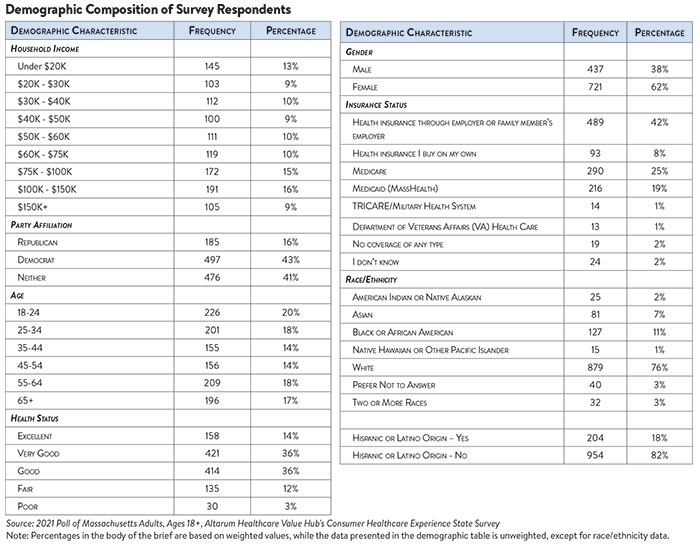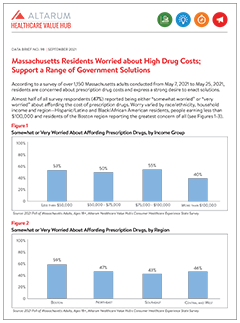Massachusetts Residents Worried about High Drug Costs; Support a Range of Government Solutions
According to a survey of over 1,150 Massachusetts adults conducted from May 7, 2021 to May 25, 2021, residents are concerned about prescription drug costs and express a strong desire to enact solutions.
Almost half of all survey respondents (47%) reported being either “somewhat worried” or “very worried” about affording the cost of prescription drugs. Worry varied by race/ethnicity, household income and region—Hispanic/Latino and Black/African American residents, people earning less than $100,000 and residents of the Boston region reporting the greatest concern of all (see Figures 1-3).
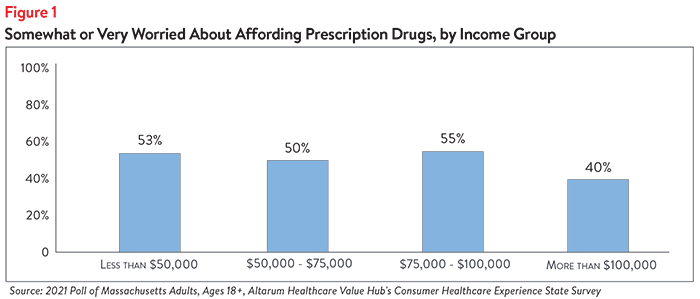
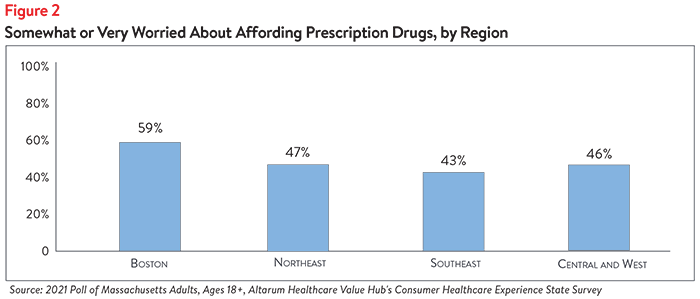
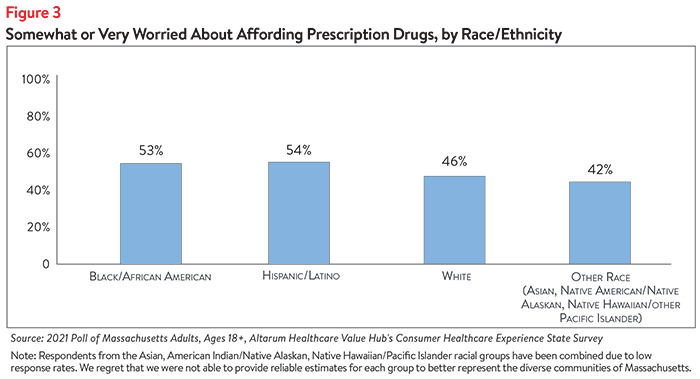
In addition to worrying about prescription drug affordability in the future, many Massachusetts residents experienced hardship due to the cost of prescription drugs in the prior 12 months. Cost concerns led nearly 1 in 4 Massachusetts residents (22%) to not fill a prescriptions, cut pills in half or skip a dose of medicine (see Figure 4).
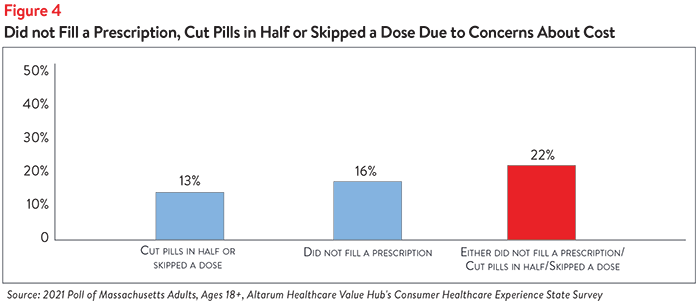
These hardships impact certain groups of Massachusetts residents more than others. As Table 1 shows, people in households earning less than $50,0001 per year are more likely to have rationed their prescription medicines than people in households making more than $100,000 per year. Rationing medication due to cost is alarmingly prevalent in middle income households, as well.
Similarly, Black/African American and Hispanic/Latino residents are more likely to cut pills in half or skip a dose of medication due to cost (25% and 22%, respectively) than residents of other races/ethnicities. Both of these groups are also more likely than other races/ethnicities to not fill a prescription due to cost—24% of Black/African American respondents and 23% of Hispanic/Latino respondents reported taking this action. Overall, 36% of Black/African American respondents and 33% of Hispanic/Latino respondents report rationing their medication in at least one of these ways (see Table 1). While these groups are more likely than other races/ethnicities to report rationing medication due to cost, 19% of White respondents and 17% of respondents identifying with the Other Race group report this behavior, as well.
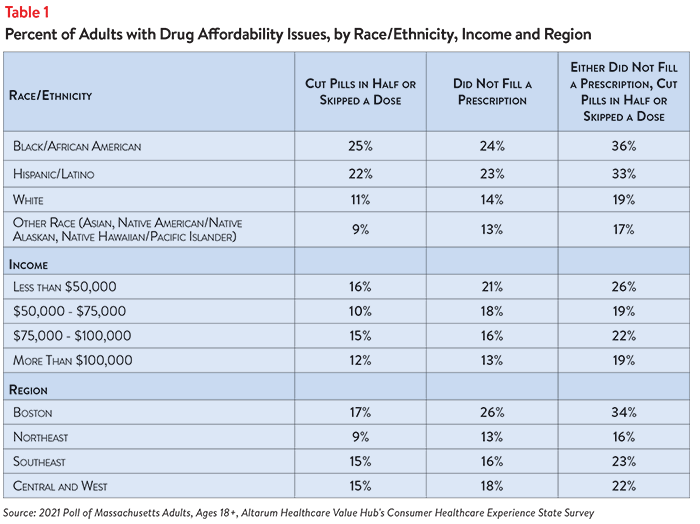
When given more than 20 options, the option cited most frequently as being a “major reason” for high healthcare costs was “drug companies charging too much money.”
- 70%—Drug companies charging too much money
- 66%—Insurance companies charging too much money
- 65%—Hospitals charging too much money
When it comes to tackling high drug costs, Massachusetts adults endorsed a number of strategies:
- 89%—Require drug companies to provide advanced notice of price increases and information to justify those increases
- 88%—Set standard prices for drugs to make them affordable
- 87%—Create a Prescription Drug Affordability Board to examine the evidence and establish acceptable costs for drugs
- 85%—Prohibit drug companies from charging more in the U.S. than abroad
Moreover, there is remarkably high support for government action on drug costs regardless of respondents' political affiliation (see Table 2).
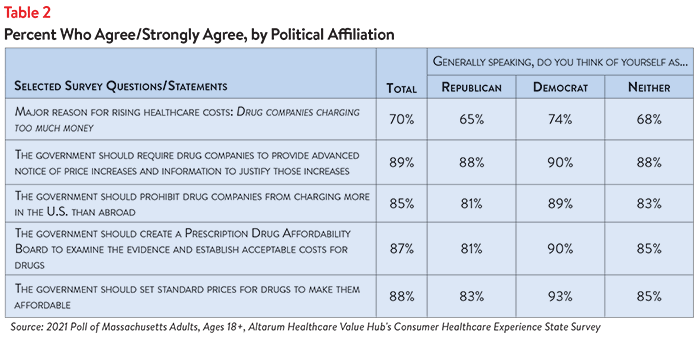
While Massachusetts residents are united in calling for the government to address high drug costs, they also see a role for themselves:
- 73% would switch from a brand name to an equivalent generic drug if given a chance
- 51% have tried to find out the cost of a drug beforehand
The high burden of healthcare and prescription drug affordability, along with high levels of support for change, suggest that elected leaders and other stakeholders need to make addressing this consumer burden a top priority.2 Moreover, the current COVID crisis is leading state residents to take a hard look at how well health and public health systems are working for them, with strong support for a wide variety of actions. Annual surveys can help assess whether or not progress is being made.
Notes
1. Median household income in Massachusetts was $81,215 (2015-2019). U.S. Census, Quick Facts. Retrieved from: U.S. Census Bureau QuickFacts: Massachusetts
2. For more detailed information about healthcare affordability burdens facing Massachusetts residents, see: Healthcare Value Hub, Massachusetts Residents Struggle to Afford High Healthcare Costs; Worry About Affording Care, Leading to Support for Government Actions to Address High Healthcare Costs, Data Brief No. 97.
Methodology
Altarum’s Consumer Healthcare Experience State Survey (CHESS) is designed to elicit respondents’ unbiased views on a wide range of health system issues, including confidence using the health system, financial burden and views on fixes that might be needed.
The survey used a web panel from Dynata with a demographically balanced sample of approximately 1,250 respondents who live in Massachusetts. The survey was conducted in English or Spanish and restricted to adults ages 18 and older. Respondents who finished the survey in less than half the median time were excluded from the final sample, leaving 1,158 cases for analysis. After those exclusions, the demographic composition of respondents was as follows, although not all demographic information has complete response rates:
